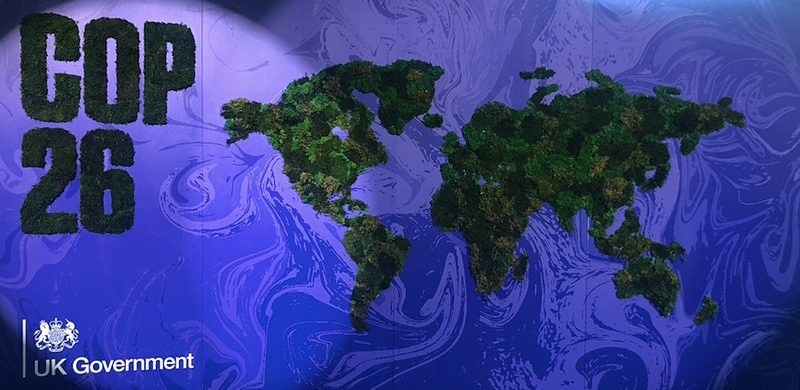COP26: What counts is what happens next.
Following the high profile UN climate summit in Glasgow in November, A Rocha UK CEO Andy Atkins, comments on the outcomes.
The success or failure of COP26 will ultimately depend on what happens next. Will progressive governments and civil society be able to use the opportunities that the Glasgow Climate Pact, the agreement which came out of COP26, offers to accelerate climate action in the year ahead? Or will the blockers prevail until all hope of keeping global temperature rise to no more than 1.5 degrees is dead? What the public, including Christians and Churches, do in the next twelve months could be decisive.
Sadly, COP26 failed to deliver on its two most important objectives: achieving a level of greenhouse gas reduction pledges which would equate with keeping global temperature rise to no more than 1.5 degrees above the pre-industrial average; and delivering on the past promise to provide $100bn a year (by 2020) to help developing countries go green and adapt to climate change.
However, a majority of countries refuse to give up on getting there. So, significantly, the Glasgow Climate Pact requests countries to update their current (inadequate) emissions cuts pledges to bring them in line with 1.5 degrees, and commits to considering the adequacy of the aggregated pledges at next year (at COP27 in Egypt), instead of waiting until 2025 as originally planned. It also promises a meeting of Ministers in the year ahead to try to achieve the long-promised climate finance flows, while acknowledging that developing countries already need much more than the originally promised amount.
Incredibly, no previous COP text has even named fossil fuels and the need to get the global economy off them, even though they are the largest single source of greenhouse gas emissions. Such has been the power of the fossil fuel ‘lobby’ – oil companies and the like – and producer countries. This time the prime culprit role of fossil fuels is spotlighted and the text calls for the ‘phase down’ of coal (the most climate-damaging of all) and an end to ‘inefficient’ fossil fuel subsidies. Of course some countries will now argue that their subsidies are ‘efficient’; but even the mention of ‘coal’, ‘fossil fuels’ and ‘subsidies’ breaks a long taboo which will open the way for more discussion and action.
Also significant at COP26 was the recognition that addressing climate change will require protecting the world’s remaining forests and other ‘carbon sinks’ such as wetlands and grasslands, and restoring these at scale. An agreement early in the conference on ending deforestation by 2030 was signed by over 120 nations, representing around 85% of the world’s forests. Whilst a roadmap for delivering that goal was lacking, there seems more intention to act this time after a similar pledge made in a different UN procress ten years ago failed to stop the destruction. This signifies an understanding that the drivers of the biodiversity crisis are often the same drivers of the climate crisis.
A Rocha UK greatly welcomes this recognition of the value of ‘Nature-based Solutions to climate change. If implemented well – including respecting the expertise and rights of local and indigenous peoples – they will be a ‘win-win-win’ with multiple benefits for climate, biodiversity and people’s livelihoods.
So, what happens now? The lack of decisive breakthroughs on the critical issues of finance and emissions cuts, coupled with agreement to return to them in 2022, adds pressure on wealthier nations, like the UK, to give much greater priority to domestic climate policy and action in the year ahead. And that underscores the critical importance of maintaining and growing public pressure for change.
Key for 2022 will be holding the UK government to account for delivering on the commitments it has made at COP26. We also need it to stand by the spirit of the agreement and abandon plans to open a new oilfield off the Shetlands.
Prime Minister Boris Johnson spoke some strong words about climate change at COP26 – but will the UK government follow through? When it comes to climate action, the proof is in the pudding. All Christians and Churches can play their part in holding the government to its promises. A Rocha UK will be providing our supporters with the means of doing so through our own programmes, such as Wild Christian and Eco Church, and through alliances we are part of. A first collaborative initiative, by the Climate Coalition of which we are a part, is to encourage the public to send the PM a Christmas card asking him to ensure that the promises made at COP26 are kept. You can send your own or add your name online to the giant card which will be delivered to No. 10 Downing Street. Sign the card here: https://www.theclimatecoalition.org/christmascard
Do use your voice to speak up for nature, and for people vulnerable to climate change and nature loss. And stand by for many more actions in the critical year between now and COP27.
Andy Atkins co-led the A Rocha worldwide family delegation to COP26 along with Seth Apiah-Kubi, CEO of A Rocha Ghana.






This is a very thought-provoking article, especially to those of us in Australia, where our government is led by a tub-thumping Christian Prime Minister. Unfortunately his actions and those of his government, fall far short of his frequently expressed Christian values, thereby bringing many of us, committed Christians, to protest at his blatant hypocrisy. In addition in a country with the most sunshine on the planet, our government does not utilise this free resource but instead promotes fossil fuels and even it worked to water down the COP pledge/statement after close of business on the final Saturday. Deforestation continues apace to provide yet more land for methane-emitting cattle in the far north, people demonstrating about continuing government climate-heating activities are demonised as being rabble-rousing, loony troublemakers. The world’s biggest problem right now is that Big money and the highest-emitting industries have a stranglehold on democratic processes in the richest countries and these people and organisations have no intention of caring and sharing with the less well off and those suffering the effects of rapid climate change. Their God is not our God, it is Mammon.
It is so good at last to hear that faiths and environment are marry up and to know one speaks for truth and honesty to bring about a wholesome change in attitudes for the future of all mankind.
Part of our role in life is to take care of the planet and the planet will take care of us.